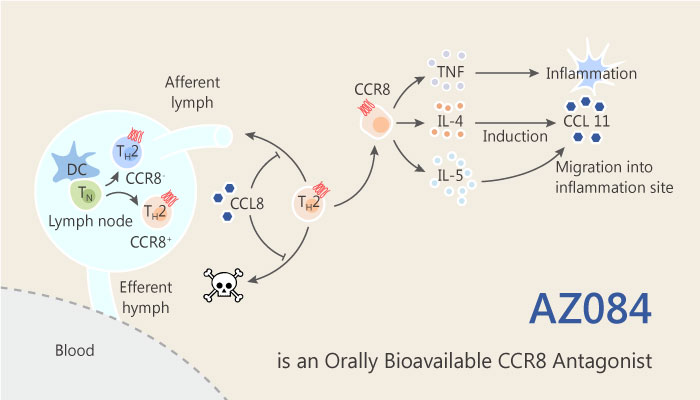The prevalence of asthma and the associated cost burden for the health care system is high. The chemokine receptor Chemokine (C-C motif) receptor 8 (CCR8) is associated with asthma.
A study from Stephen Connolly discovered and identified a CCR8 antagonist AZ084.
In vitro, AZ084 showed overall excellent primary properties such as high potency, good lipophilicity range, high free fraction in blood, acceptable stability in vitro, much reduced CYP 2D6 inhibition and importantly excellent hERG selectivity.
AZ084 is a potent, selective, allosteric and oral active CCR8 antagonist, with a Ki of 0.9 nM.
AZ084 showed no binding activity at 10 mM towards any of the other chemokine receptors evaluated. Therefore, AZ084 exhibited an excellent selectivity profile in vitro. The antagonist also showed very good selectivity (>40,000-fold) towards a panel of ion channels known to be involved in QT prolongation. Moreover, the antagonist did not show any effect on trafficking of the hERG channel measured as surface expression in wild type hERG expressing HEK292 cells. AZ084 has no activity towards 5-strain AMES and is negative in the mouse lymphoma assay. Furthermore, AZ084 inhibits dendritic cell, T cell and eosinophil migration.
Pharmacologically, AZ084 was shown to to have a bioavailability >70% in rat. The AUC was 4.4 μM h with a Tmax less than 2 h. Furthermore, a large free fraction was observed in human, dog, rat and mouse plasma. The antagonist was well tolerated in rats and dogs exposed for 7 consecutive days at doses up to 650 mg/kg/day and 8.7 mg/kg/day, respectively. In dog telemetry studies a small effect was observed with moderate QTc prolongation (~5%) at doses corresponding to 100× the predicted dose-to-man.
To conclude, AZ084 is a promising clinical candidate for the treatment of asthma with safety profile.
